 |
| Torjägerkanone |
Since its inception in 1963, Bundesliga has been one of the most-watched and followed leagues in the world. Despite being dominated by Bayern Munich for decades, the German league has always had a fairytale story down the years. Currently, Bundesliga is the most entertaining league in the world with an average of just under three goals per match.
Here we take a look at the top 10 goalscorers in the Bundesliga.
10. Klaus Allofs - 177 goals
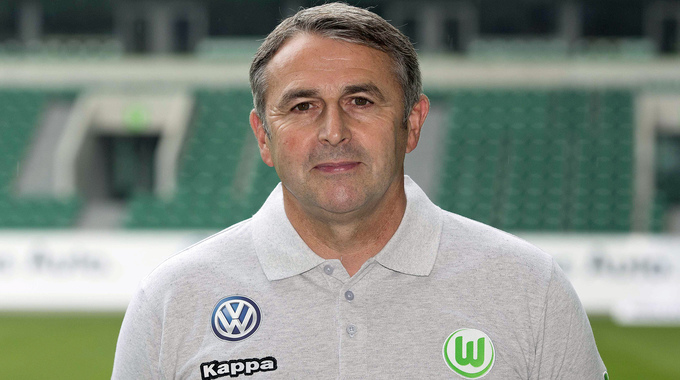 |
| One of the best players in the history of Fortuna Dusseldorf |
One of Fortuna Dusseldorf's greatest ever, Klaus Allofs started his professional career with his hometown club of Fortuna Dusseldorf in 1975. Playing during one of the most successful eras of the club, Allofs helped Fortuna to two DFB Pokal trophies as well as to a runners-up title in the UEFA Cup Winners Cup before joining FC Cologne in 1981.
Klaus continued his goalscoring touch with Cologne as he became the first player in the history of Bundesliga to win the topscorer with two different teams. During his six seasons at the club, the striker helped Cologne reach the finals of the 1985-86 UEFA Cup and added one DFB Pokal title.
The forward moved to France after his FC Cologne stint, joining French giants Marseille in 1987. Two seasons with Les Phoceens was followed by a move to Bordeaux in 1989 after winning the Ligue1 and Coupe de France with Marseille.
A season with Bordeaux was followed by a move back to his homeland to join Werder Bremen. Way past his best and at the old age of 34, Allofs spent three season river islanders before retiring in 1993. It was during his time in Bremen that the forward finally won his first and only Bundesliga title. He ended his career after winning the Bundesliga, DFB Pokal and the UEFA Cup Winners Cup with Werder Bremen.
Klaus Allofs made 56 appearances for his country scoring 17 goals. He was part of the 1980 European Championship winning squad of Germany as well as the famous 1986 German team that lost to Diego Maradona's Argentina.
A prolific goalscorer throughout his career, Klauss Allofs scored an incredible 177 goals in 424 Bundesliga matches.
9. Dieter Muller - 177 goals
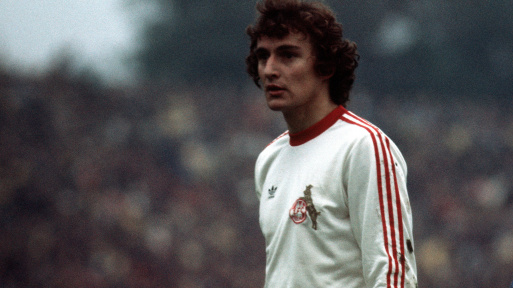 |
| FC Cologne second-highest goalscorer |
The most successful period in the history of FC Cologne coincided with the rise of Dieter Muller. The striker made his professional debut in 1973 with Kickers Offenbach after coming through their youth system.
Despite making just two appearances, Dieter Muller found himself moving to Cologne the following season. It was at Cologne that Dieter Muller made himself a household name in the German Bundesliga. The Cologne legend spent eight seasons at the Rhine-based club helping them win their second Bundesliga title as well as two DFB Pokals. During his eight seasons at Cologne, Muller finished as the top scorer of the Bundesliga on two occasions, incredibly scoring six goals in 73 minutes on one occasion in a single league match.
1981-82 season saw Muller moving to Stuttgart before moving outside his country to join Bordeaux in 1982. At France, Muller won two more league title this time with Girondins Bordeaux before moving to Switzerland to join Grasshopper Club Zurich in 1985. A season at Switzerland was followed by a move back to his homeland to join FC Saarbrucken in 1986. A move back to his boyhood club Kickers Offenbach followed the next season before retiring from the game in 1989.
Muller's international career though was a very brief one. The striker made just 12 appearances but scored an impressive 9 goals, representing West Germany in 1976 European Championship.
A prolific goalscorer throughout his career, Dieter Muller scored an impressive 177 goals in 303 Bundesliga appearances.
8. Stefan Kuntz - 179 goals
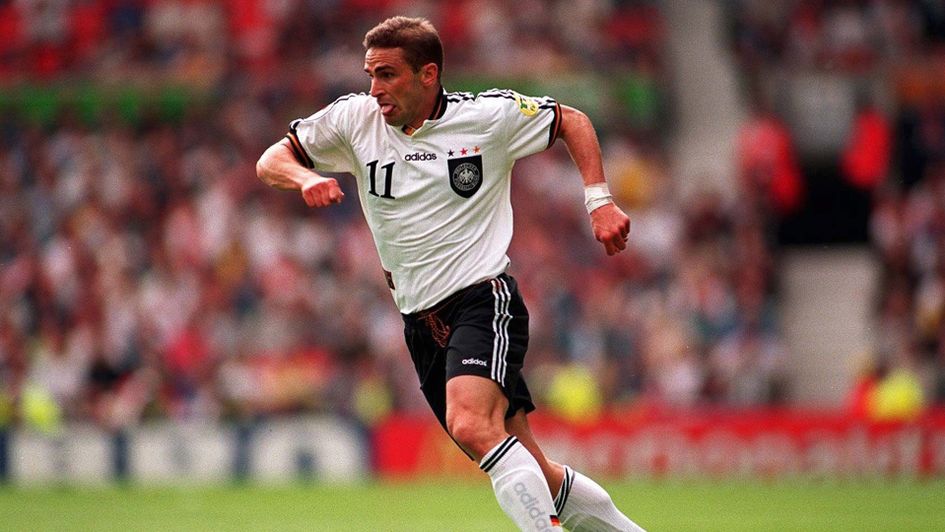 |
| A European Championship winner with Germany |
A product of Borussia Neunkirchen youth Academy, Stefan Kuntz made his professional debut in 1980 and spent three seasons with his boyhood club before making his Bundesliga debut in 1983 with VFL Bochum.
At Bochum, Kuntz established himself as one of the best young prospects in German football. Three seasons at Bochum and a Bundesliga top scorer award later, Kuntz decided to move to Bayer 05 Uerdingen. The striker was once again on the move after three seasons, this time moving to FC Kaiserlaturen in 1989.
It was at the South-west German side that Kuntz tasted his first and only Bundesliga title as well as his first and only DFB Pokal title. Kuntz spent six seasons with Kaiserlautern before moving to Turkey to join Besiktas in 1995.
A brief one-year stint at Turkey was followed by a return to Bundesliga with Arminia Bielefeld. Two seasons with Bielefeld was followed by a return to Bochum before retiring from the game for the first time in 1999. Kuntz, however, reversed his decision and returned to action in 2002 with lower league side SV Furpach before finally retiring from the game in 2005 after playing a season with FC Palatia Limbach.
A European Championship winner with Germany in 1996, Stefan Kuntz made 25 appearances for his national side scoring 6 times before ending his brief but championship winning four years.
Stefan Kuntz ended his Bundesliga career after scoring 179 goals in the Bundesliga in 449 appearances. He also won two Bundesliga topscorer award, one each with VFL Bochum and FC Kaiserlautern.
7. Ulf Kirsten - 181 goals
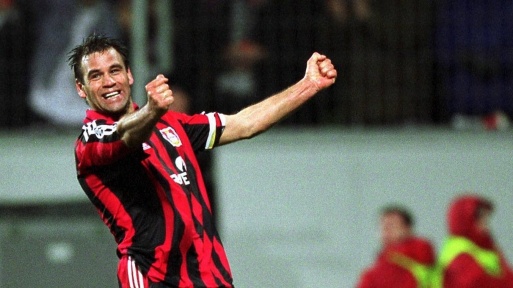 |
| A Spy for East Germany, a legend at Bayer Leverkusen |
A title winner with East Germany and a title winner with the reunified Germany, Ulf Kirsten was arguably one of the best players ever to have been born on the Eastern side of Germany. A product of East Germany's most popular club Dynamo Dresden, Ulf Kirsten made his professional debut in 1983 in the East German league with Dynamo Dresden.
Working as a footballer and as a secret agent or a 'Stasi' under codename Knut Kruger, Ulf Kirsten enjoyed huge success in the East German league winning the now-defunct DDE Oberliga twice and the FDGB Pokal twice. The fall of the Berlin Wall in 1989 made drastic changes to the footballing in Germany and saw the striker moving to the Bay Arena to join Bayer Leverkusen in 1990, becoming one of the first East German players to do so.
An instant hit at the Bay Arena, Kirsten spent the rest of his professional career with the Die Werkself. A gifted striker, Kirsten finished as a top scorer in the Bundesliga on three occasions for Leverkusen. Despite his goalscoring prowess, Bayer Leverkusen managed to win just one DFB Pokal while he was playing with them.
The East-German born striker made over 100 caps for Germany (49 with East Germany and 51 with West Germany) and was the first player to reach a total of 100 caps while playing for two different nations. Kirsten spent 10 years with the reunified German side between 1990 and 2000 but failed to win any silverware. The striker also scored an impressive 34 goals (14 for East Germany) during his 100 international matches.
Ulf Kirsten spent thirteen seasons with Bayer Leverkusen before retiring in 2003. During his thirteen seasons, he was part of the 'Eternal Bridesmaids' squad that saw Bayer Leverkusen finishing runners up in 4 Bundesliga seasons, 1 DFB Pokal, 1 DFB- Super Cup and the UEFA Champions League. A prolific scorer throughout his career, Kirsten scored an impressive 181 goals in 350 Bundesliga appearances.
6. Claudio Pizzaro - 197 goals
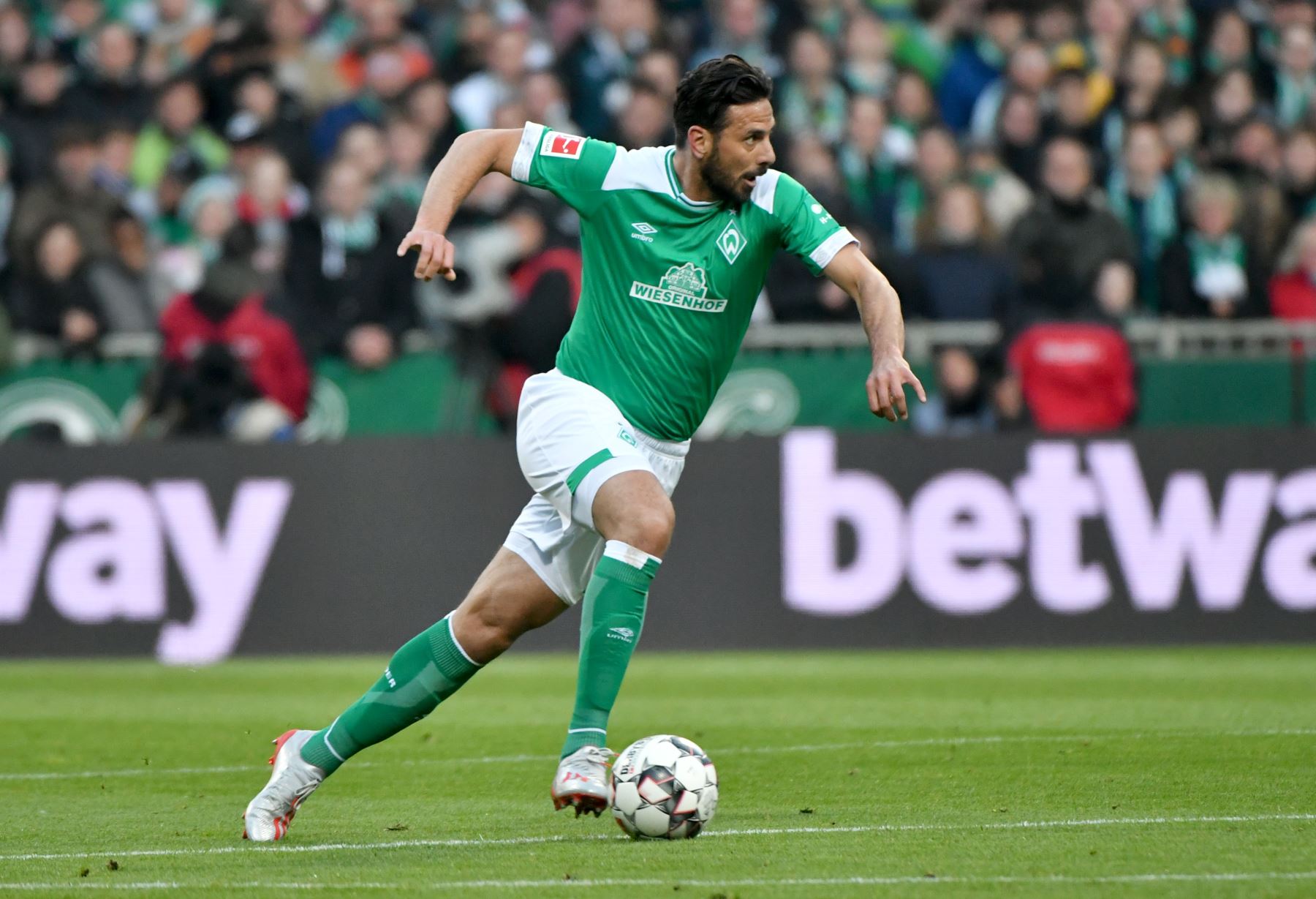 |
| One of the two players in this list who are still active |
The current grand old man of the Bundesliga, Claudio Pizzaro started his footballing career way back in 1996 with Peruvian side Deportivo Pesquero after coming through the youth academy of Cantolao. Pizzaro's goalscoring talent was quickly taken note by Peruvian giants Alianza Lima and joined the club in 1997, one year after making his debut.
The striker continued his goalscoring touch to his new club and helped them finish second in the Peruvian Primera Division and Torneo Apertura while winning the Torneo Clausura. The young striker soon found himself on a plane to Bremen in 1999 after three seasons in the Peruvian League.
The Peruvian born made his Bundesliga debut in 2000 for Werder Bremen. A change in the continent never had much effect on the young striker as Pizzaro quickly hit the ground running. Two seasons with Bremen was followed by a big-money move to German giants Bayern Munich. It was the first of his two spells with the Bavarian against. During his first spell with the German giants, Pizzaro won three Bundesliga titles, three DFB Pokals and the Intercontinental Cup before moving the Premier League to join Chelsea in 2007.
A failed move to Chelsea was followed by a return back to Werder Bremen the following season. Four seasons back at Bremen saw the was followed by a second spell at Bayern Munich. It was during the second spell at Bayern, that Pizzaro enjoyed his most success. The Peruvian won three Bundesliga titles, two DFB Pokals, 1 DFL Supercup, 1 UEFA Super Cup, 1 FIFA Club World Cup and 1 UEFA Champions League.
Three seasons at Bayern was followed by a third return to Werder Bremen in 2015. Two seasons at Bremen was followed by a move to Cologne in 2017 before returning to Werder Bremen for the fourth time in 2018 following Cologne's relegation, where he still plays.
Claudio Pizzaro enjoyed a long career with his national side after having made his debut in 1999. He played 82 times for his national side and scored 20 times while also representing the nation in four Copa America.
The Peruvian striker holds various records in the Bundesliga. Claudio Pizzaro is the oldest to score in the Bundesliga as well as the oldest player to score a hat-trick in the Bundesliga. He is also Werder Bremen's all-time leading goalscorer and the second-highest goalscoring foreigner in the history of Bundesliga.
Claudio Pizarro has scored an impressive 197 goals in 479 Bundesliga matches. The Peruvian will be hoping to add three more to his tally before retiring from the game.
Comments
Post a Comment